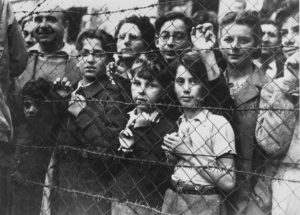Humankind can be generous, gentle and loving.
We humans, though, also are capable of extreme hatred.
Today isn’t the day to remember the good side of humanity, but to remember its cruelest behavior. International Holocaust Remembrance Day reminds us of just how dastardly we humans can behave.
There have been remembrances in Europe, where millions of Jews died at the hands of Nazi butchers prior to and during World War II.
***
I want to share a point of personal privilege. I’ve had the honor of seeing up close the monuments to man’s monstrous acts.
Yad Vashem is a museum located between Jerusalem and Tel Aviv in Israel. It tells the story of what the Nazis did to European Jews. They killed an estimated 6 million human beings, consigning them to starvation, assorted forms of physical torture and then sent to gas chambers in death camps scattered throughout central and eastern Europe.
The Israelis certainly remember the Holocaust. Indeed, their country was founded in 1948 by Europeans who fled to the Middle East to establish a homeland.
I had the honor — I won’t call it a “pleasure” — of touring Yad Vashem in June 2009. I will never forget the emotional impact of that museum and the history told by people whose ancestors suffered so grievously.
Germans also recall their shame in what Adolf Hitler brought to their nation. The Nazi tyrants — along with their Japanese allies — stood trial in Nuremberg after World War II; they were charged with crimes against humanity.
Nuremberg has erected what is called a Documentation Center. My wife and I visited Nuremberg in September 2016 and I got to see how Germany has confronted its shame. The Documentation Center tells the story in graphic language and images.
Germans won’t forget, either.
***
But such acts of genocide aren’t restricted to Europe or are committed only by Europeans.
In 1989 and again in 2004, I was able to tour killing fields in Cambodia, on the other side of the planet. They remain as a silent testimony to Pol Pot’s murderous regime, which was exposed to the world when Vietnamese troops routed Pol Pot from power in 1978.
I remember talking in 1989 to a young woman, who told me if Pol Pot — who was still living at the time — were to return, “We all will become soldiers” who would fight him to the death.
There are many other examples of humanity’s capacity for unspeakable horror. They have occurred in places such as Uganda, in Armenia, the Balkans, China and, oh yes, in the United States of America — where Native Americans were routed from their own homeland by settlers who moved from east to west in the 18th and 19th centuries.
We mustn’t forget these lessons of history.
As Nobel laureate Elie Wiesel has said, “The opposite of love isn’t hate. It is indifference.”

